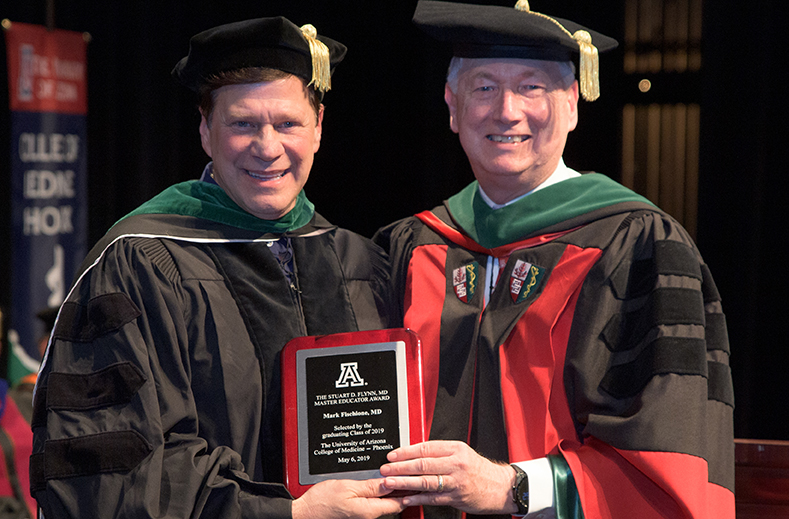
Medical Examiner Inspires Next Generation to Pursue Forensic Pathology

Mark Fischione, MD, is a retired Maricopa and Yavapai County medical examiner with 22 years of service. Even after retirement, though, he works as a forensic pathologist for Gila County and an expert witness for trials. But his most gratifying work is with medical students.
“The students make it all worth it,” said Dr. Fischione, an associate professor of Pathology at the University of Arizona College of Medicine – Phoenix. “I don’t need to teach. I have my retirement, my work at the county and court cases, but the one thing that keeps me going is the students.”
Dr. Fischione is the only medical examiner who teaches at the College of Medicine – Phoenix. Across the country, there are only about 500 board-certified forensic pathologists. One of the reasons he continues to teach is to inspire the next generation of MDs to pursue forensic pathology.
“Truth be told, there is a shortage of pathologists and there is going to be a shortage of pathologists if we don’t populate the specialty,” he said. “I try to pique their interest by making pathology fun and memorable.”
Dr. Fischione has been teaching medicine since 1996: at the UA College of Medicine – Phoenix for more than 12 years (the Embryology, Histology and Pathology Block for MS1s and MS2s) and physician assistant students at Northern Arizona University in Phoenix for five years.
If you ask any of his students, Dr. Fischione’s teaching is unrivaled, which is one of the many reasons he was selected the 2019 recipient of the Stuart Flynn, MD, Master Educator Teaching Excellence Award.
“Dr. Fischione has an unrivaled passion for educating the future generation of physicians,” Savanah McMahon, MD, Class of 2019, said. “He incorporates his sense of humor into his lectures, which makes for a highly engaging learning experience. He has helped me immensely during my pursuit of a career in pathology and if it wasn't for him, I don't know if I would have found my love for teaching as soon as I did. I will forever be grateful for his mentorship.”
Dr. Fischione mimics the teaching style of one of his favorite college professors, who he said never competed with students and made lectures interesting and animated.
“He always told me that if you talk with students instead of lecture to them, it becomes infectious,” Dr. Fischione said. “That is how I pattern my teaching style. I don’t go into a room with an attitude of ‘You need to listen to me.’ I go in there with an attitude that we are going to converse and in the process, you will learn something and so will I.”
Dr. Fischione said he always knew he wanted to be a physician, but never imagined himself as a medical examiner. It wasn’t until completing a rotation as a pathology resident at a medical examiner’s office that he realized his calling. At the time, he had about 50 autopsies under his belt, but this was the first homicide. He described the moment like a “light shined down and said ‘I can do this.’ ”
While he loves teaching, he still has a passion for pathology.
“My favorite part of being a medical examiner is the challenge of speaking for the dead,” Dr. Fischione said. “When I testify in court, I’m there for the deceased to tell their story and give their due in order to put a bad person in jail.”
Topics
About the College
Founded in 2007, the University of Arizona College of Medicine – Phoenix inspires and trains exemplary physicians, scientists and leaders to advance its core missions in education, research, clinical care and service to communities across Arizona. The college’s strength lies in our collaborations and partnerships with clinical affiliates, community organizations and industry sponsors. With our primary affiliate, Banner Health, we are recognized as the premier academic medical center in Phoenix. As an anchor institution of the Phoenix Bioscience Core, the college is home to signature research programs in neurosciences, cardiopulmonary diseases, immunology, informatics and metabolism. These focus areas uniquely position us to drive biomedical research and bolster economic development in the region.
As an urban institution with strong roots in rural and tribal health, the college has graduated more than 1,000 physicians and matriculates 130 students each year. Greater than 60% of matriculating students are from Arizona and many continue training at our GME sponsored residency programs, ultimately pursuing local academic and community-based opportunities. While our traditional four-year program continues to thrive, we will launch our recently approved accelerated three-year medical student curriculum with exclusive focus on primary care. This program is designed to further enhance workforce retention needs across Arizona.
The college has embarked on our strategic plan for 2025 to 2030. Learn more.